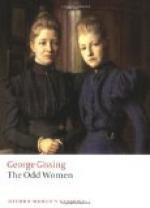’That little place, Barfoot, is one of the sacred spots of the earth. Strange to think that the house has been waiting for me there through all the years of my hopelessness. I feel that a mysterious light ought to shine about it. It oughtn’t to look just like common houses.’
On his way home Everard thought over what he had seen and heard, smiling good-naturedly. Well, that was one ideal of marriage. Not his ideal; but very beautiful amid the vulgarities and vileness of ordinary experience. It was the old fashion in its purest presentment; the consecrated form of domestic happiness, removed beyond reach of satire, only to be touched, if touched at all, with the very gentlest irony.
A life by no means for him. If he tried it, even with a woman so perfect, he would perish of ennui. For him marriage must not mean repose, inevitably tending to drowsiness, but the mutual incitement of vigorous minds. Passion—yes, there must be passion, at all events to begin with; passion not impossible of revival in days subsequent to its first indulgence. Beauty in the academic sense he no longer demanded; enough that the face spoke eloquently, that the limbs were vigorous. Let beauty perish if it cannot ally itself with mind; be a woman what else she may, let her have brains and the power of using them! In that demand the maturity of his manhood expressed itself. For casual amour the odalisque could still prevail with him; but for the life of wedlock, the durable companionship of man and woman, intellect was his first requirement.
A woman with man’s capability of understanding and reasoning; free from superstition, religious or social; far above the ignoble weaknesses which men have been base enough to idealize in her sex. A woman who would scorn the vulgarism of jealousy, and yet know what it is to love. This was asking much of nature and civilization; did he grossly deceive himself in thinking he had found the paragon?
For thus far had he advanced in his thoughts of Rhoda Nunn. If the phrase had any meaning, he was in love with her; yet, strange complex of emotions, he was still only half serious in his desire to take her for a wife, wishing rather to amuse and flatter himself by merely inspiring her with passion. Therefore he refused to entertain a thought of formal marriage. To obtain her consent to marriage would mean nothing at all; it would afford him no satisfaction. But so to play upon her emotions that the proud, intellectual, earnest woman was willing to defy society for his sake—ah! that would be an end worth achieving.
Ever since the dialogue in which he frankly explained his position, and all but declared love, he had not once seen Rhoda in private. She shunned him purposely beyond a doubt, and did not that denote a fear of him justified by her inclination? The postponement of what must necessarily come to pass between them began to try his patience, as assuredly it inflamed his ardour. If no other resource offered, he would be obliged to make his cousin an accomplice by requesting her beforehand to leave him alone with Rhoda some evening when he had called upon them.




